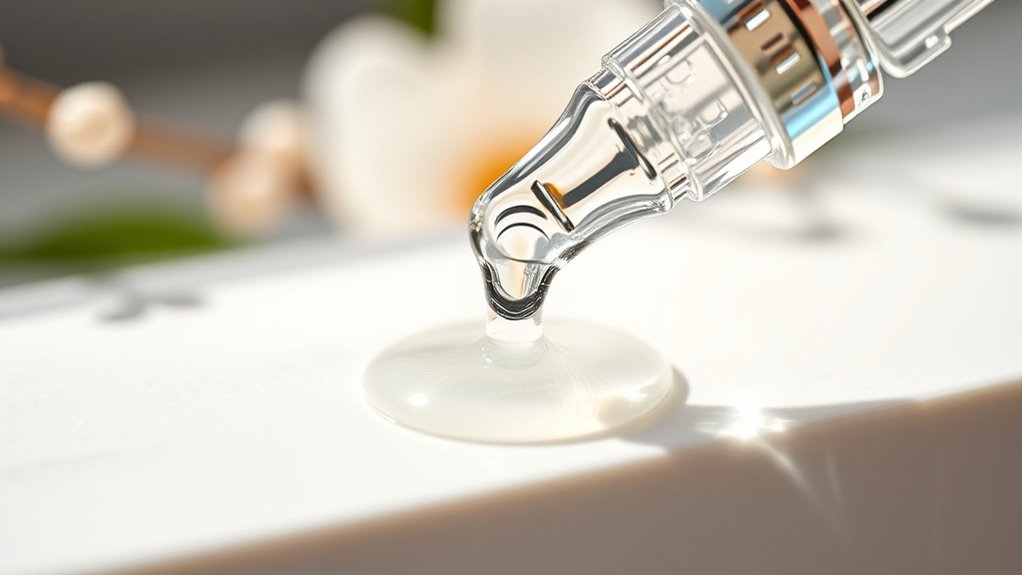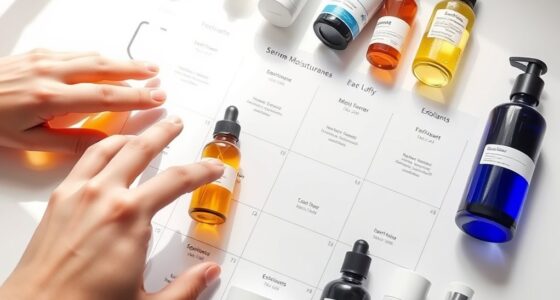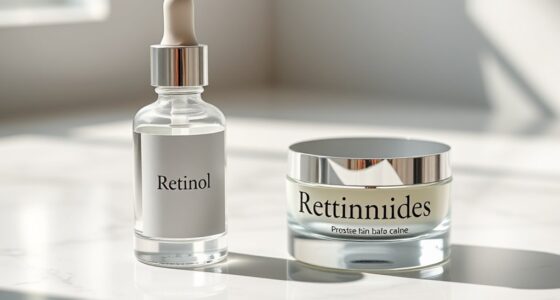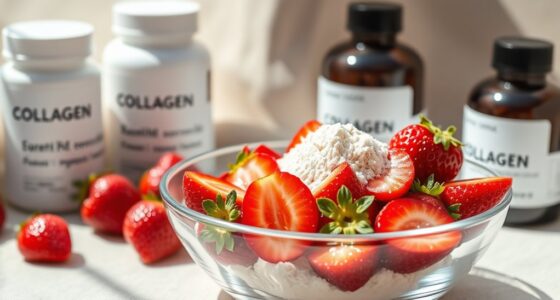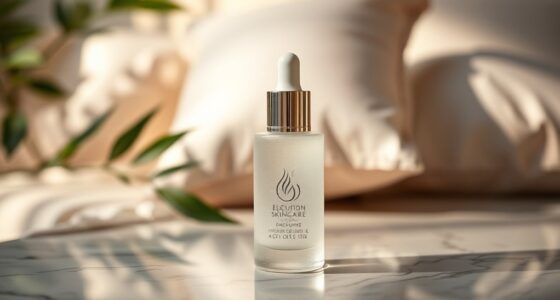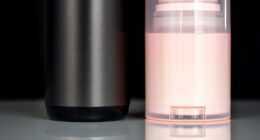Peptides in skincare really do work. They act as messengers that boost your skin’s production of collagen, elastin, and other key proteins, helping to reduce fine lines and improve firmness. When combined with botanical extracts and used regularly along with sun protection, peptides can enhance your overall skin health and resilience. Staying consistent with these ingredients can lead to noticeable, long-term improvements. Keep exploring to discover how to maximize their benefits in your routine.
Key Takeaways
- Peptides act as messengers, stimulating collagen and elastin production for firmer, more youthful skin.
- When combined with botanical extracts, peptides enhance skin resilience and provide antioxidant benefits.
- Peptides support skin health but require sun protection, as UV damage can diminish their effectiveness.
- Consistent use of peptide-containing products yields cumulative, long-term improvements in skin texture and appearance.
- Proper formulation and routine integration make peptides a proven, effective component of anti-aging skincare.
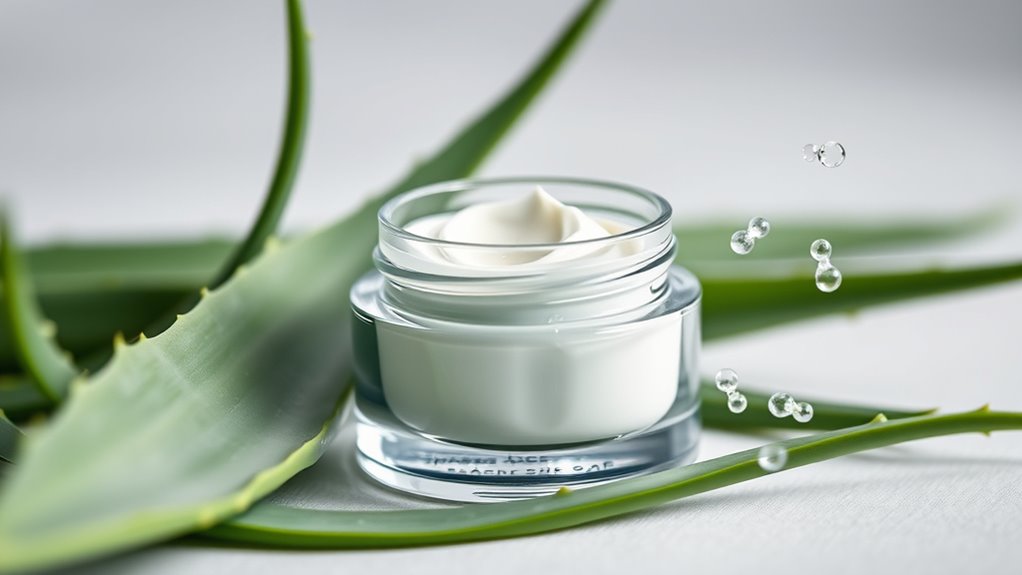
Peptides have become a popular ingredient in skincare because they can effectively support your skin’s health and appearance. These small chains of amino acids act as messengers, signaling your skin to produce more collagen, elastin, and other essential proteins. When integrated into your routine, peptides can help diminish fine lines, firm your skin, and improve overall texture. But to maximize their benefits, many formulations include botanical extracts, which enhance the skin’s resilience and provide additional antioxidants. Botanical extracts like green tea, chamomile, and aloe vera work synergistically with peptides, soothing irritation and defending against environmental damage. They also contribute to the skin’s natural barrier, making it more resistant to pollutants and stressors. With a balanced blend of peptides and botanical extracts, your skincare can deliver not only anti-aging effects but also a calmer, healthier complexion.
Sun protection is another important factor when using peptide-based products. UV rays accelerate skin aging by breaking down collagen and damaging cellular DNA. While peptides support collagen synthesis, they’re not a substitute for sunscreen. Instead, they work best alongside sun protection measures, helping your skin recover and maintain its youthful structure after sun exposure. Applying a broad-spectrum SPF during the day shields your skin from harmful rays, preventing the degradation of the very proteins peptides aim to boost. Many peptide formulations come with added SPF or are recommended to be used under a sunscreen. This combination ensures your skin stays protected from UV damage while benefiting from the regenerative properties of peptides. If you neglect sun protection, your efforts with peptides might be undermined, as UV-induced damage can negate the improvements you’re trying to achieve.
Incorporating peptides into your skincare routine allows for a targeted approach to aging and skin health. The key is choosing products that contain high-quality peptides paired with botanical extracts that suit your skin type. Remember, consistent use is essential; peptides don’t work overnight. You’ll want to apply these products regularly, ideally in the morning and evening, to see lasting results. And don’t forget about sun protection—wearing a broad-spectrum SPF daily is critical to preserving the gains you make with peptides. When combined with botanical extracts and diligent sun protection, peptides become a powerful component of your skincare arsenal. They help your skin stay resilient, youthful, and radiant over time, making your effort worthwhile.
Frequently Asked Questions
Are Peptide Skincare Products Suitable for Sensitive Skin?
Yes, peptide skincare products can be suitable for sensitive skin, especially if they come in hypoallergenic formulations. These products are designed to minimize ingredient sensitivities and reduce irritation. However, it’s essential to check the ingredient list for potential allergens and patch test new products prior to regular use. If you have specific sensitivities, consult with a dermatologist to ensure the peptides won’t cause adverse reactions.
How Long Does It Take to See Visible Results From Peptides?
Most people see visible results from peptide formulations within 4 to 6 weeks. Consistent application frequency, usually once or twice daily, boosts effectiveness. An interesting stat: a study found that 65% of users noticed improvements in skin firmness and elasticity within this period. To maximize benefits, stick to your skincare routine and be patient, as consistent use is key to revealing the full potential of peptides.
Can Peptides Replace Other Anti-Aging Ingredients?
Peptides can’t fully replace other anti-aging ingredients because ingredient synergy enhances overall effectiveness. Incorporate peptides into your routine using proper application techniques, like gentle patting and layering with antioxidants or retinoids. While peptides target firmness and elasticity, ingredients like hyaluronic acid and vitamin C address hydration and brightness. Combining them creates a holistic approach, maximizing benefits and helping you achieve healthier, youthful skin over time.
Are There Any Side Effects Associated With Peptide Use?
Peptide use is generally safe, but you might experience side effects like peptide allergies or unexpected product interactions. These reactions are rare but can be severe, so always patch-test new products. If you notice redness, itching, or swelling, discontinue use immediately. To avoid issues, read labels carefully, especially if you have sensitive skin or allergies, and consult a dermatologist for personalized advice. Your skin’s health is worth the extra caution!
Do All Peptides in Skincare Products Have the Same Effectiveness?
Not all peptides in skincare products have the same effectiveness because their peptide molecular structures vary, influencing how well they penetrate your skin and signal collagen production. Additionally, peptide stability affects their ability to deliver benefits; unstable peptides may degrade before working. To get the best results, look for products with well-designed peptide structures and formulations that enhance their stability, ensuring they reach your skin effectively.
Conclusion
While peptides show promise in skincare, their true effectiveness depends on factors like formulation and skin type. Don’t assume they’re a miracle cure, but don’t dismiss them either. Sometimes, believing in their potential can boost your confidence and skincare routine. The key is understanding that no single ingredient is a magic fix—true results come from consistent care and realistic expectations. Peptides can be a helpful part of your regimen, but they’re not the sole answer to youthful skin.
